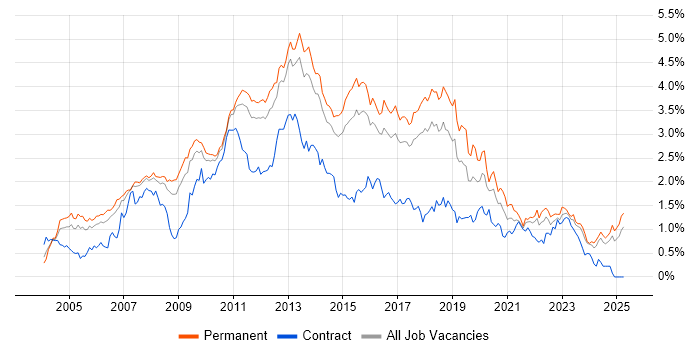Transact-SQL
England > East of England
The table below provides summary statistics and salary benchmarking for jobs advertised in the East of England requiring T-SQL skills. It covers permanent job vacancies from the 6 months leading up to 6 February 2026, with comparisons to the same periods in the previous two years.
| 6 months to 6 Feb 2026 |
Same period 2025 | Same period 2024 | |
|---|---|---|---|
| Rank | 154 | 126 | 151 |
| Rank change year-on-year | -28 | +25 | +21 |
| Permanent jobs citing T-SQL | 4 | 51 | 43 |
| As % of all permanent jobs in the East of England | 0.088% | 1.50% | 0.99% |
| As % of the Programming Languages category | 0.75% | 4.44% | 2.92% |
| Number of salaries quoted | 4 | 34 | 40 |
| 10th Percentile | - | - | £26,000 |
| 25th Percentile | £39,438 | £43,750 | £31,750 |
| Median annual salary (50th Percentile) | £42,175 | £47,500 | £42,500 |
| Median % change year-on-year | -11.21% | +11.76% | -15.00% |
| 75th Percentile | £49,622 | £51,625 | £61,250 |
| 90th Percentile | £58,099 | £53,375 | £64,250 |
| England median annual salary | £50,000 | £55,000 | £55,000 |
| % change year-on-year | -9.09% | - | -4.35% |
All Programming Languages
East of England
T-SQL falls under the Programming Languages category. For comparison with the information above, the following table provides summary statistics for all permanent job vacancies requiring coding skills in the East of England.
| Permanent vacancies with a requirement for coding skills | 534 | 1,148 | 1,471 |
| As % of all permanent jobs advertised in the East of England | 11.77% | 33.71% | 33.88% |
| Number of salaries quoted | 408 | 557 | 1,203 |
| 10th Percentile | £30,000 | £39,900 | £32,500 |
| 25th Percentile | £40,000 | £47,500 | £42,500 |
| Median annual salary (50th Percentile) | £55,000 | £65,000 | £55,000 |
| Median % change year-on-year | -15.38% | +18.18% | -8.33% |
| 75th Percentile | £69,063 | £73,750 | £70,000 |
| 90th Percentile | £83,750 | £80,000 | £83,750 |
| England median annual salary | £62,500 | £65,000 | £60,000 |
| % change year-on-year | -3.85% | +8.33% | -7.69% |
T-SQL
Job Vacancy Trend in the East of England
Historical trend showing the proportion of permanent IT job postings citing T-SQL relative to all permanent IT jobs advertised in the East of England.

T-SQL
Salary Trend in the East of England
Salary distribution trend for jobs in the East of England citing T-SQL.

T-SQL
Salary Histogram in the East of England
Salary distribution for jobs citing T-SQL in the East of England over the 6 months to 6 February 2026.
T-SQL
Job Locations in the East of England
The table below looks at the demand and provides a guide to the median salaries quoted in IT jobs citing T-SQL within the East of England region over the 6 months to 6 February 2026. The 'Rank Change' column provides an indication of the change in demand within each location based on the same 6 month period last year.
| Location | Rank Change on Same Period Last Year |
Matching Permanent IT Job Ads |
Median Salary Past 6 Months |
Median Salary % Change on Same Period Last Year |
Live Jobs |
|---|---|---|---|---|---|
| Cambridgeshire | - | 3 | £42,175 | - | 3 |
| Essex | - | 1 | £62,500 | - | 5 |
| T-SQL England |
|||||
T-SQL
Co-Occurring Skills & Capabilities in the East of England by Category
The following tables expand on the one above by listing co-occurrences grouped by category. They cover the same employment type, locality and period, with up to 20 co-occurrences shown in each category:
|
|
||||||||||||||||||||||||||||||||||||||||||
|
|
||||||||||||||||||||||||||||||||||||||||||
|
|
||||||||||||||||||||||||||||||||||||||||||
|
|
||||||||||||||||||||||||||||||||||||||||||
|
|
||||||||||||||||||||||||||||||||||||||||||
